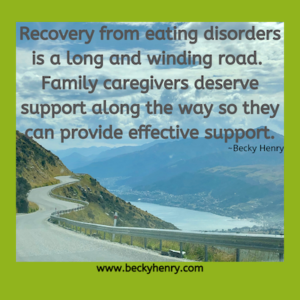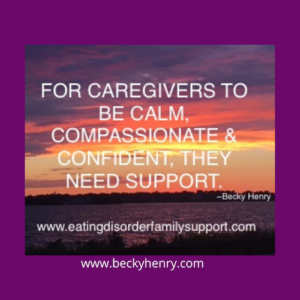 Thankfully most treatment now includes some sort of education and possibly some support for the family caregivers. We’re getting closer to it becoming mainstream to include family caregivers in the “treatment team.” Sadly, it still is uncommon unfortunately for treatment to include providing direct support to the family caregiver who is living through a major life crisis and needs their own help to cope.
Thankfully most treatment now includes some sort of education and possibly some support for the family caregivers. We’re getting closer to it becoming mainstream to include family caregivers in the “treatment team.” Sadly, it still is uncommon unfortunately for treatment to include providing direct support to the family caregiver who is living through a major life crisis and needs their own help to cope.
For the person with the eating disorder, solid, evidence-based treatments matter. And if the family to whom the person is returning to live with hasn’t done their parallel process AND gotten a lot of their own support…treatment is not going to produce the desired results.
Self-care is the foundation for success as a parent or other family caregiver of someone with an eating disorder. It’s easy to see the huge difference it makes when you see a family caregiver who has had their own support to learn how to practice self care as well as work through all of the challenges. Parents who are new to this, just want help to find “the best” treatment.
It takes a dedicated team to gently and clearly guide the family caregiver to process the fears, worries, questions and overwhelm so that they can become; calm, compassionate, confident caregivers.
Here is what I’ve seen while providing professional coaching for families over the past 20 years regarding self-care:
1. Without self-care family caregivers become:
| Depleted | Anxious |
| Frustrated | Rescuers |
| Hopeless | Fear-filled |
| Angry | Suffering |
| Scared | Enabling |
| Impatient | Exhausted |
2. Without family caregiver support and self-care, clinicians have shared they experience:
- Daily phone calls with questions & concerns
- Inability to take in the information that is being shared
- Fears driving the bus
- Families pulling loved ones out of treatment early
- Lack of trust of the treatment team
- Difficulty managing their own distress and tolerating loved one’s distress
- Lack of understanding of their role
- Frustration with the process
- Communication challenges with everyone
Everything builds on the foundation of self-care. This allows for building blocks for success.
3. With support and accountability to practice regular self-care; family caregivers become:
| Calm | Stronger |
| Compassionate | Fun people again |
| Confident | Patient |
| Less fearful | More hopeful |
| Empathetic without rescuing | Skilled at boundary setting AND follow through |
| Experienced in growth | Effective communicators |
| Peace-filled | Self care experts |
If you’re working with family caregivers who are in the first two categories and would love to work with caregivers who are in the 3rd category, let’s chat. You do not need to reinvent the wheel, or hire more staff. We’ve got easy to implement HUG Kits, Recovery Roadmaps and Eating Disorder Caregiver Coach Training.
And families, if your loved one’s team is not yet providing support for you the caregiver, you can ask them to do so. It will help improve the treatment outcomes.

